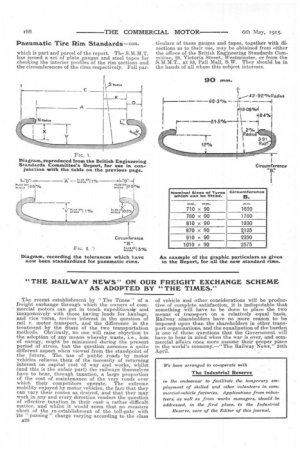"THE RAILWAY NEWS" ON OUR FREIGHT EXCHANGE SCHEME AS ADOPTED BY "THE TIMES."
Page 8

If you've noticed an error in this article please click here to report it so we can fix it.
The recent establishment by " The Times" of a freight exchange through which the owners of commercial motors can get in touch expeditiouslcy and inexpensively with those having loads for haulage, and vice versa, revives interest in the question of rail v. motor transport, and the difference in the treatment by the State of the two transportation methods. Obviously, no one will raise objection to the adoption of any means whereby waste, i.e., lose of energy, might be minimized during the present period of stress, but the question assumes a quite different aspect when viewed from the standpoint of the future. The use of public roads by motor vehicles relieves, them of the necessity of returning interest on capital cost of way and works, whilst (and this is the unfair part) the railways themselves have to bear, through taxation, a large proportion of the cost of maintenance of the very roads over which their competitors operate. The extreme mobility enjoyed by motor vehicles, the fact that they can vary their routes as desired, and that they may work in any and every direction renders the question of effective taxation in their ca.0 a rather difficult matter, and whilst it would seem that no measure short of the re-establishment of the toll-gate with its " passing " charge varying according to the class
A28
of vehicle and other considerations will be productive of complete satisfaction, it is indisputable that something will., have to be done to place the two means of transport on a relatively equal basis. Railway shareholders have no more reason to be imposed upon than the shareholders in other transport organizations, and the equalization of the burden is one of those questions that the Government will have to bear in mind when the war is over,and commercial affairs once more assume their proper place in the world's economy.—" The Railway News," 24th April.






















